Taylor Swift 101: From poetry to business, college classes offer insights on 'Swiftology'
Take a look at collegiate classes across the United States and you’ll find that Miss Americana, Taylor Swift, was voted most likely to educate you.
Many colleges – from state universities to the Ivy Leagues – are using the ubiquitous pop star’s appeal and talent to teach their lessons. Thousands of students have maxed out classroom capacity, filling online and physical halls to the brim. As one instructor, Catherine Fairfield, at Northeastern University in Boston put it, “I think students are intellectually thirsty.”
While every course has the same topic, instructors around the country are using Swift to teach subjects including business, economics, hospitality, tourism, public relations, journalism, poetry, literature, English, copyright and trademark law, gender studies and psychology.
“I’m just fascinated by what everybody at the different schools is doing," Fairfield said. "I think it’s so cool.”
We spoke to four instructors about the "New Romantics" singer and how her "life is just a classroom."
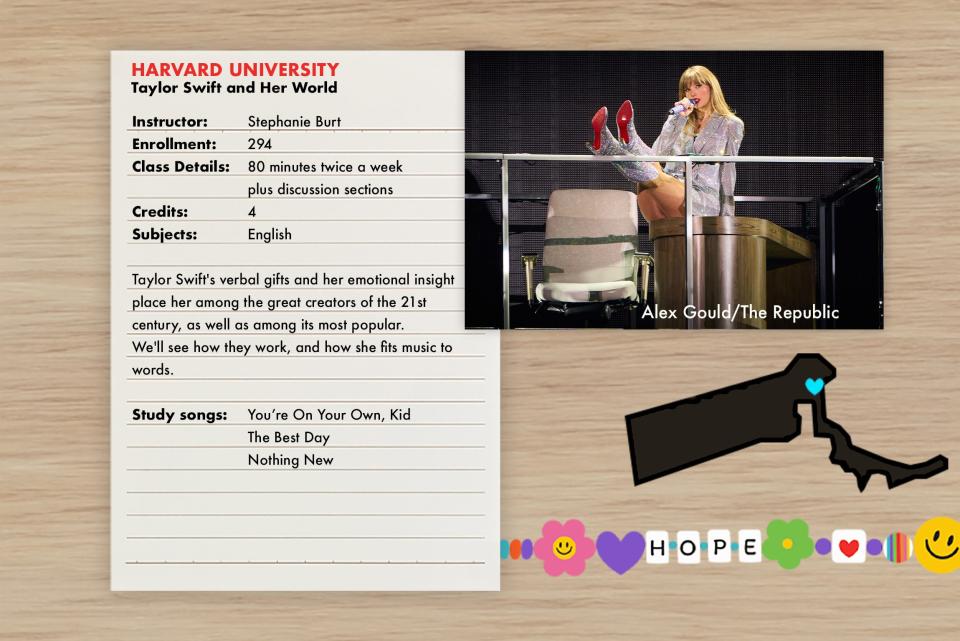
Harvard: Take the moment and taste it
At Harvard University in Cambridge, Massachusetts, Stephanie Burt, 52, is preparing for “Taylor Swift and Her World,” a three-paper class that will take a literary approach to studying the multifaceted songwriter.
"Taylor Swift's verbal gifts and her emotional insight place her among the great creators of the 21st century,” Burt said, “as well as among its most popular. We'll see how they work, and how she fits music to words."
In a harmonious transition from literary greats William Wordsworth or Samuel Taylor Coleridge, Burt will delve into how Swift’s writing provides a front row seat to the human experience that is not limited to breakups but extends to grief and loss, being socially ostracized, being pushed down by a patriarchal society and being innately gifted versus experientially learned.
“You can’t separate them,” Burt said about Swift’s songwriting talent being taught or biologically given, “because the more you’re enthusiastic about something and the more you have the energy for something, the more you devour the models around you as things you can imitate, learn from and then build on. I don’t think it’s possible to divide talent from inspiration, or whatever is innate from whatever is acquired. It’s also important to add if she had had a different upbringing or less supportive parents, emotionally and financially, she would not have been able to develop this fast.”
Nearly 300 undergraduates registered for the jam-packed, 80-minute class. One of many themes Burt will dissect is the idea of being simultaneously a public persona and an adroit songwriter.
“Some people want to play music and don’t want to be seen,” she said. “And some people want to be seen and the music is secondary, and it doesn’t matter if they write their songs. Taylor is someone who can’t stop writing songs, but she also really wants to be heard and seen. She is always going to need the kind of external validation of fans coming up and saying, ‘You’re singing about my life. Not just your life, but my life, too.’ And that’s something that both ‘You’re On Your Own, Kid’ and ‘Nothing New’ say from very different perspectives.”
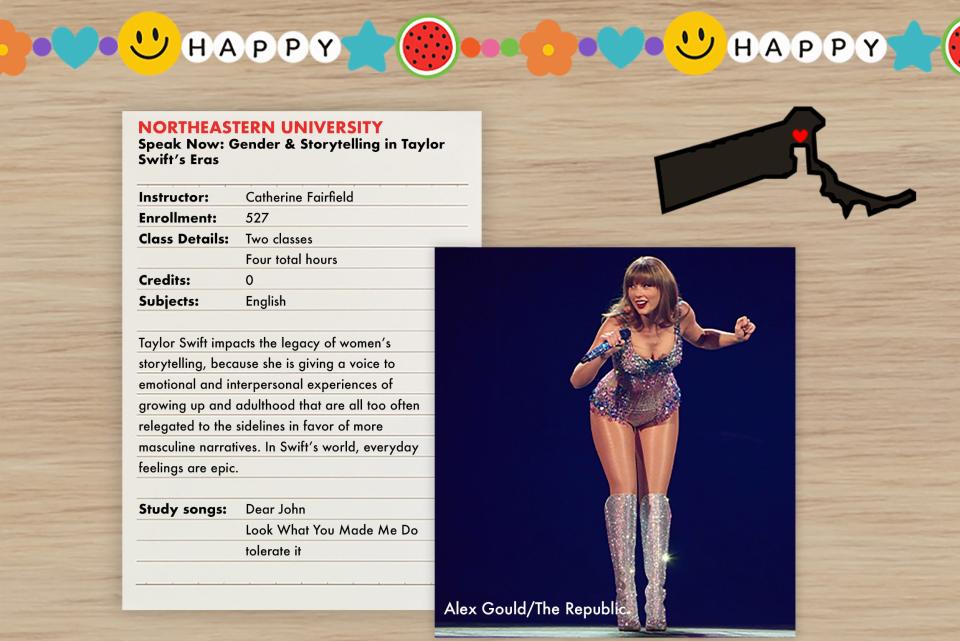
Northeastern University: There's nothin' like a mad woman
Across the Charles River from Harvard is Northeastern University, where Catherine Fairfield, 31, is fine-tuning her lesson plan for a two-day Zoom course to 527 students.
“I live my life waiting for these e-mails,” Fairfield said jocularly about receiving the invitation to teach Swift. The class will highlight the intersection of English literature and gender studies, studying womanhood, witch hunts, diary and confessional writings, and what is deemed socially acceptable for women’s fame and women’s success. She hopes the noncredited lectures will lead to a semester-long class in the fall.
“We will dive into how there are certain ways that women throughout history tend to share their stories and share their experiences with each other,” Fairfield said. “Some are very public but not fully accepted by all genders. There are also versions of storytelling that are much more private and less socially acceptable.”
Fairfield credits “Folklore“ and “Evermore” as the fulcrum that shifted public perception favorably toward Swift.
“The two albums were explicitly literary and artistic in a way that even skeptics had trouble pushing back on,” she said. “She’s now someone that you’ll hear in almost any social space. If people are having small talk and talking about popular culture, she’s likely to come up. It’s now way more comfortable and more fun to talk about. There are going to be fewer people thinking about the negative aspects of her public image.”
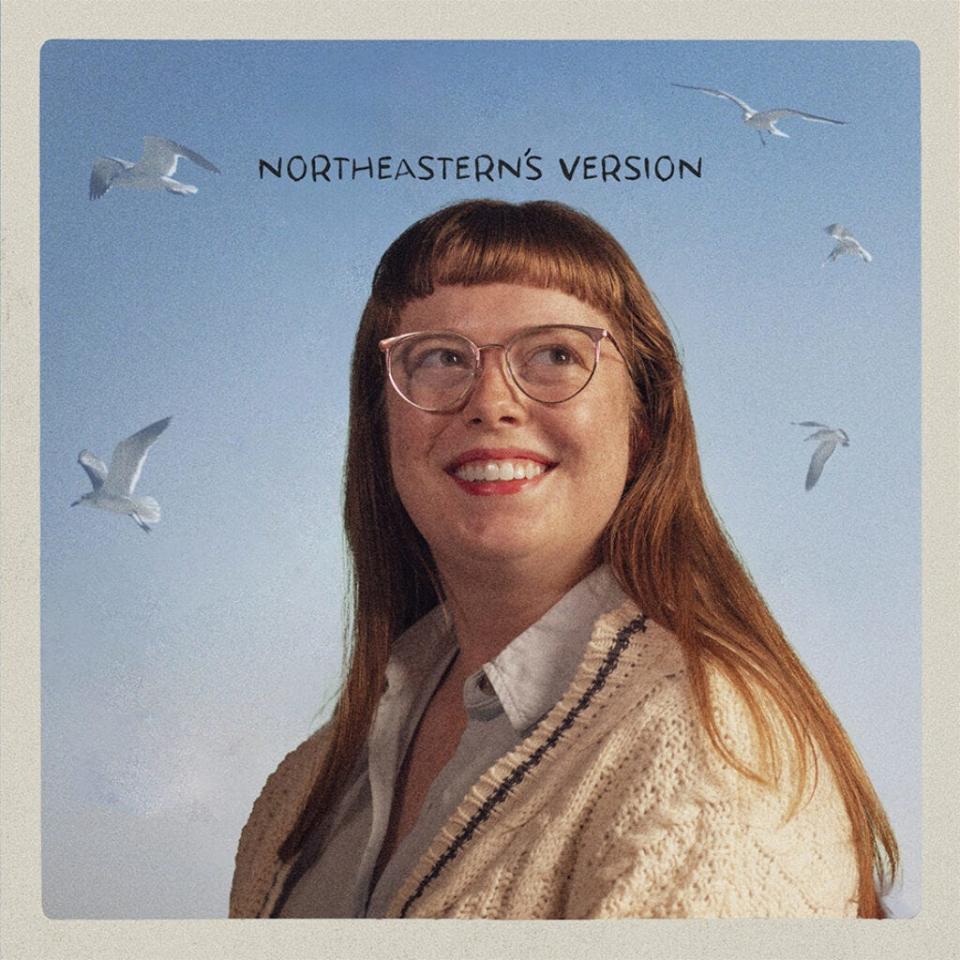
The avowed “true Swiftie” has followed the singer’s career for nearly two decades and is looking forward to the release of "Reputation (Taylor’s Version)." The original album was met with criticism of a scorned, mad Swift. Now the possibility of a rerecording is met with enthusiasm.
“Why are there so many people that I know who said that they were Taylor Swift fans, and then ‘Reputation’ came out and they didn’t want to talk about it anymore?” she asked. “And they didn’t like it. Cause she’s angry. She’s probably going to relive a lot of anger when she rereleases ‘Reputation (Taylor’s Version)’ because that anger doesn’t go away. These feelings don’t just disappear. You don’t just write about them and then they’re gone and they dissipate.”
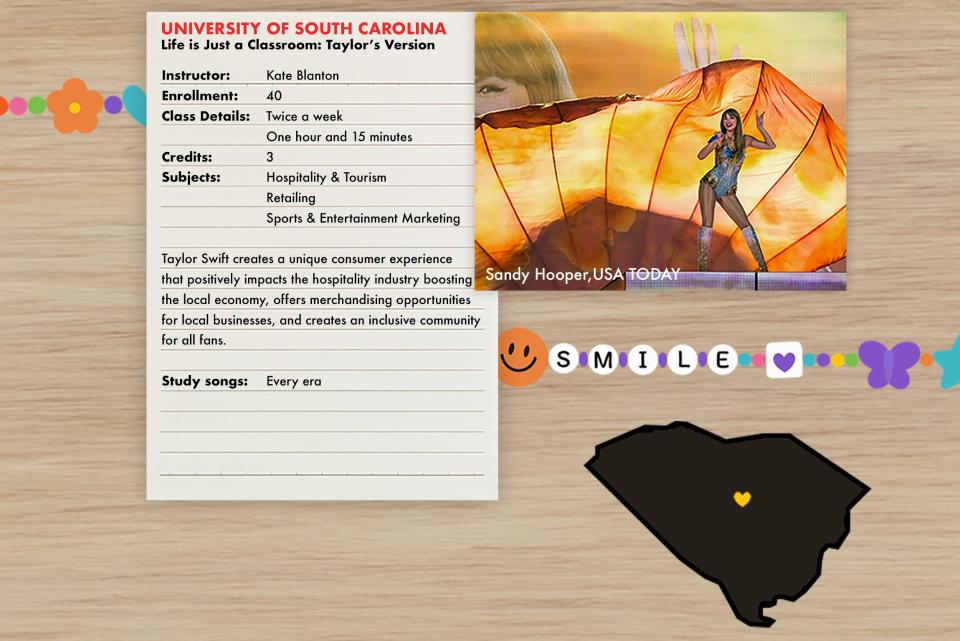
University of South Carolina: Honey, life is just a classroom
‘Cause baby, I could build a curriculum, out of all the bricks they threw at me. At the University of South Carolina in Columbia, Kate Blanton will explore Swift the businesswoman, billionaire and philanthropist.
“I saw other schools teaching Taylor for English and sociology,” said Blanton, 43, “and I work in such a unique department that I thought, this would be so cool for us.”
Blanton will teach a more intimate class of 40 students majoring in hospitality and tourism, sports and entertainment management, and retailing. She came up with the idea in June while attending the “Eras Tour" in Cincinnati.
“We’re really going to be getting into the business side,” Blanton said. Among the topics sprinkled in her lesson plans: Swift’s economic impact, ticket sales, merchandising, philanthropy, “fan”-demonium and corporate sponsorships.
“I want students to take away an appreciation for who Taylor Swift is as an artist and businesswoman,” she said, “but also as a human.”
The three-credit class will culminate in a class project of students hosting a philanthropic event for the Gamecock Pantry, a nonprofit campus resource of donated canned goods and foods.
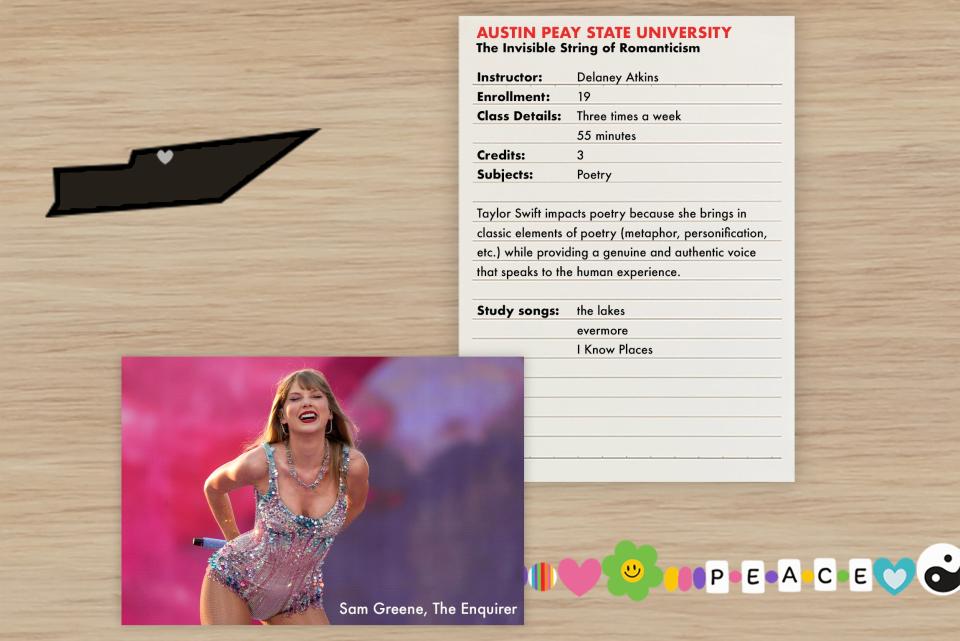
Austin Peay State University: Take me to the lakes where all the poets went to die
Fifty miles northwest of Nashville, Tennessee, Delaney Atkins teaches “The Invisible String of Romanticism” at Austin Peay State University in Clarksville. The playful poetry course explores threads shared by Swift’s songwriting and great poets like William Wordsworth.
“She’s one of those once-in-a-lifetime individuals,” said Atkins, 27. “The core of the class is based on the movement of romanticism so it’s really talking about the overflowing of emotions, the ‘I’ perspective, writing from your own point of view and drawing on nature. We go album-by-album and era-by-era and I select a handful of songs that exemplify those ideas.”
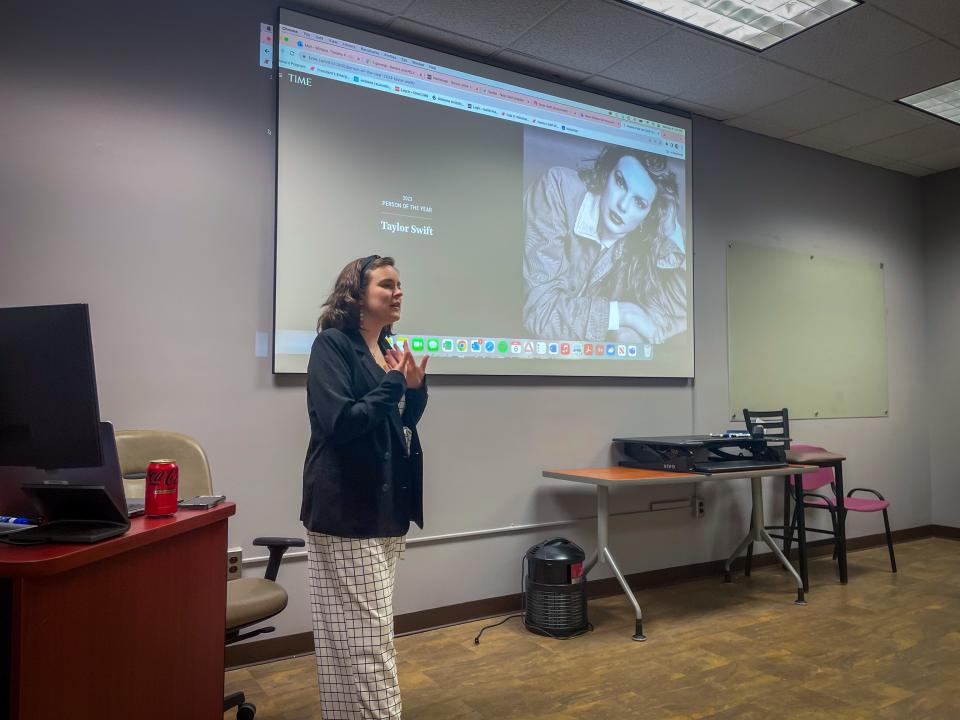
Nineteen students completed the class in the fall of 2023 studying Swift’s poetic devices, writing perspectives and literary motifs like her use of “snow,” “rain” and the color “blue.”
“She’s able to take ideas that she’s had since the beginning,” Atkins said, “but make them more refined and mature. One of my favorite parallels is found in the song 'Cold As You' from (her debut album) and 'Peace' from 'Folklore.' It’s cool to see an idea that she had at 15 coming to fruition in a more poetic and beautiful way in one of her newer albums.”
Atkins pointed to Bob Dylan winning the 2016 Nobel Prize in literature and said Swift may accomplish a similar feat: “I genuinely could see her winning if she continues on with the caliber of art that she’s creating.”
All along there was an invisible string
These four classes only scrape the surface of Swift curricula across the nation. The University of California, Berkeley offers an "Artistry and Entrepreneurship: Taylor's Version" class. The University of Texas at Austin has “The Taylor Swift Songbook.” Stanford University has “All Too Well (10 Week Version).” Arizona State University offered a “Psychology of Taylor Swift” class, and New York University's Swift class made headlines in 2021.
Swift's reach and impact are so massive that if it existed, Swifties would likely pay $13,000 a year to attend a Taylor Swift University.
Follow Bryan West, the USA TODAY Network's Taylor Swift reporter, on Instagram, TikTok and X as @BryanWestTV.
This article originally appeared on Nashville Tennessean: Taylor Swift 101: Inside the college classes about the singer
